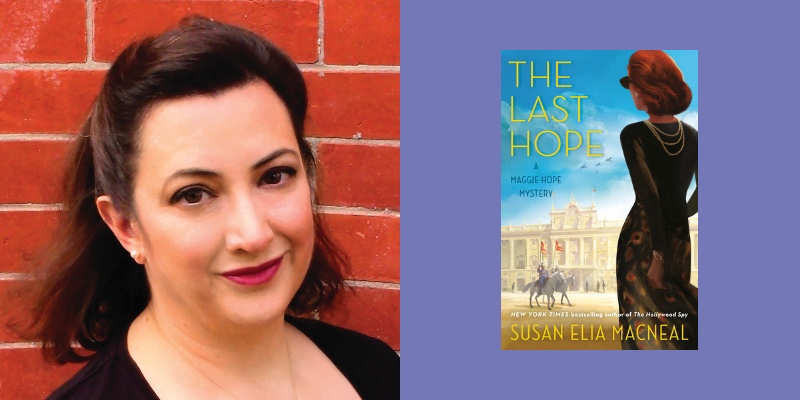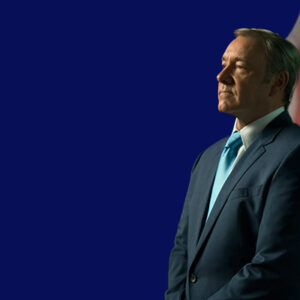Crime fiction authors are often asked about the inspirational alchemy that sparked the idea for their central characters and where they see them going in subsequent books. Because, let’s face it, popular series—I’m looking at you Bosch, Rebus and Reacher—are wins for writers, readers and publishers. For readers, picking up the next installment of a favorite series gives them the opportunity to spend time with old friends, for authors and for publishers it’s working with a known entity that increases the odds for sales.
But what about writers who intentionally conclude their series?
Some writers, Arthur Conan Doyle comes to mind, have wanted nothing more than to divest themselves of their creations. Other fictional characters—Marlowe, Spenser and, yes, Sherlock Holmes—are so popular they transcend the deaths of their original creators.
For Susan Elia MacNeal, who concludes her popular World War Two-era Maggie Hope mystery series with The Last Hope, the war was winding down and “Maggie deserved to be happy,” she needed a break from the darkness. And, as it turns out, so did Maggie’s creator.
Nancie Clare:
Inspired by a tour of Churchill’s War Rooms, the first book of your series featuring Maggie Hope debuted in 2012 with Mr. Churchill’s Secretary. Twelve years later, Maggie is retiring in The Last Hope. You’ve shared what sparked the series, but can you talk about what prompted you to let Maggie retire?
Susan Elia MacNeal:
There were a few things going on in The Last Hope: the beginnings of talk about the nuclear bomb; the beginnings of the Britain becoming a lesser power on the world stage and the beginnings of the Cold War. I felt like World War II was over and Maggie deserved a chance to be happy.
Nancie Clare:
When you thought of your character’s last name, was that intentional? Although you don’t use “Hope” in every title, you’ve used it in a few. It is a clever hook. Was that part of it, or did her name just come to you as her character?
Susan Elia MacNeal:
That’s so funny. I looked up her birth year, which is 1915, and Margaret was one of the top three girls’ names for that year. And I really loved how Margaret was very old fashioned, but then when you say Maggie, it’s really accessible and vibrant and present—almost contemporary. And then with Hope, I was looking through just lists of famous Britons just to sort of get an idea for her last name, somewhere to start. And I saw Bob Hope and I thought “Hope, oh, I like that.” So there you have it.
Nancie Clare:
So, it started with the name and then it made your life easier with some of the titles…
Susan Elia MacNeal:
Well, a light bulb went on that the name that could be both a traditional British surname but can mean much more. But wasn’t thinking about titles at that point. I was thinking about writing a book!
Nancie Clare
And now you think that Maggie deserves a rest. How does it feel to you to let her go, and how do you think her fans are going to react? I’m guessing not well, because I’m not dealing with it well.
Susan Elia MacNeal
Well, I’m absolutely heartbroken, to be quite honest with you. This has been a tough year for me. I let Maggie go. My son has gone off to college. I myself am going through menopause. It’s a lot of endings in beginnings. So, it’s been really hard for me. And I understand readers may find it hard in a way. I’m glad in that that means I’ve done a good job. But I hope that readers will also want to stick around and see what else I can do.
Nancie Clare
Do you think writers of series should think about their novels as an arc with a beginning and an ending?
Susan Elia MacNeal
I think we are all trying, and it’s all very hard to do in practice. It’s very hard to gauge the market. It’s very hard to time things. I think we’re just all lucky to have books out at all. I’m always grateful when one of my books comes out. So yeah, I think it’s a luxury that not everybody has,
Nancie Clare
What did your publisher do when you called up and said Maggie’s going to retire?
Susan Elia MacNeal
They were understanding.
Nancie Clare
One of the most compelling aspects of your novels—and that includes Mother Daughter Traitor Spy, the standalone that you wrote in 2022— is a look at the distaff side of war. And while it’s getting a bit more attention now, I think deep dives into the subject of women at war is still way behind the curve. Although women may not have been in the artillery or on the front lines—although they were nurses— they were as neck deep in the conflict as any of their male counterparts and just as dead if things went wrong.
Susan Elia MacNeal
Women were definitely not as acknowledged, if acknowledged at all. World War II was a sea change in many ways for women in the military, in the armed services. And part of it was, quite frankly, Britain’s desperation. They just didn’t have the manpower and they had to rely on women. For instance, with SOE—Special Operations Executive, the secret agent organization Maggie worked for—took in a lot of women, especially women who were bilingual, French or familiar with France. But there was a huge controversy about it. It was against the Geneva Convention. [The SOE] were terrified what would happen if word got out that they were doing this. I mean, it wasn’t revealed until years and years later that women were serving behind enemy lines.
Nancie Clare
When we spoke in 2022 about Mother Daughter Traitor Spy for the Speaking of Mysteries podcast, I asked you what you were going to do next. And you told me that Maggie was going to Spain where she was going to confront Chanel, whom she had encountered before in Paris. And lo and behold, in addition to The Last Hope, there’s The New Look, the television series that compares and contrasts the wartime experiences of Coco Chanel and Christian Dior. And at the center of the show’s story arc is Chanel’s trip to Madrid and misbegotten attempt on behalf of the Nazis to influence Churchill to make a separate peace. When Maggie Hope makes her trip to Madrid to assess Germany’s progress in creating an atomic bomb and, if needed, kill the man who would be building it, she encounters Chanel, who’s in town to influence Churchill. Why do you think this Quixotic attempt to persuade the British to make peace found its way into The Last Hope and The New Look. Is this something that was recently declassified?
Susan Elia MacNeal
There were always sort of whispers and rumors about it. I think it was always kind of silenced. And then in 2011 Sleeping with the Enemy: Coco Chanel’s Secret War by Hal Vaughn was published. The book certainly informed my seventh Maggie Hope book, The Paris Spy, which was published in 2017. But the stories about Chanel and her Nazism really stuck with me. And I came back to it because I thought it was so powerful, and it was such an untapped story—a World War II story about a really famous figure. And I think there must be other people, other scholars, other writers, filmmakers who read the book and were like, “oh, we didn’t know this. And what an interesting jump off point for drama: let’s revisit her myth and her icon status and look at the totality of her history.” I think it’s interesting that people are taking a fresh look at Chanel and including this in her background.
The other thing is that fashion is political. And Coco Chanel’s fashion was political. She had a very fascist-forward viewpoint in her clothing. She made clothes that looked like uniforms. She used a lot of black and white. She used interlocking “C’s” that looked a lot like the swastika that [was introduced] only one year after the swastika was created as a symbol of Nazi Germany. She favored women in the outdoors. She favored women who were very young and trim and athletic and slim. These are all sort of fascist qualities. And also, that [Chanel’s clothes] are a uniform for the elite. That’s another sort of fascist idea. A lot of the 1930s fascism certainly permeated her designs.
Nancie Clare
And she certainly embraced fascism and Nazis, as you said. Did you see The New Look?
Susan Elia MacNeal
I have seen it, yeah.
Nancie Clare
I thought it was a pretty damning portrait of Chanel.
Susan Elia MacNeal
I thought it went easy on her.
Nancie Clare
It’s interesting how ideas are in the ether. You didn’t know that The New Look was coming along when you planned this novel. And I’m sure they didn’t know that someone who occupies this space in the crime fiction community was coming out with a book.
Susan Elia MacNeal
I just think there are things in the air, and it does happen sometimes. And again, I think we could probably all trace it back to that book that came out in 2011. It takes a while for the ripples to go through, but I’m sure that was a huge inspiration for the filmmakers.
Nancie Clare
How you feel about The New Look? Do you think it was a good rendition of some of the conflicts and some of the conflicts and both internal and external of the characters?
Susan Elia MacNeal
I loved the costume design. I loved the makeup. I loved all of the scenes in Paris and Madrid, and most of it was just gorgeous to watch. I didn’t love the characters. My heart wasn’t in it. I wasn’t captivated. I think it’s good that people are talking about these parts of history and there’s focus on World War II. It’s nice to see a new angle. And it was interesting to compare and contrast Chanel and Dior because they were in Paris during the Nazi years and then did very different things in the 50’s and 60’s. It’s all very interesting, but I never fell in love with it.
I watched it because of the subject matter, but I felt a bit like it was homework.
Nancie Clare
The Nazis were desperate; they were losing, and they had no hesitation in maneuvering a willing participant … but I just can’t get over the hubris that Chanel thought she could influence Churchill into a separate peace.
Susan Elia MacNeal
Well, the whole thing was completely hair brained. But that’s from our perspective. In that year, they were desperate. They thought they had some kind of hope for some sort of way to get to Churchill, and this is what they did. Some might say Chanel actually drove the deal. We don’t really know, but she could have offered herself and her services to make herself look like less of a…
Nancie Clare
Collaborator?
Susan Elia MacNeal
Collaborator and more of someone who was actually trying to work towards peace. That would certainly paint her in different light. And I think she knew the war was lost and she needed to kind of hustle to make herself not a target.
Nancie Clare
What’s next for you?
Susan Elia MacNeal
I’m now with a new editor and I’m going to be doing a new standalone and new series. I’m very excited about that.
Nancie Clare
What can you tell me about the standalone?
Susan Elia MacNeal
It is set in London in 1966. Three former SOE agents come to London because there’s a memorial being erected for them. And they meet up with the daughter of a fallen comrade who has done a lot of research and tells them that their mission was compromised—and it wasn’t compromised by the Nazis. It was compromised from within. The three women plus the daughter get together to solve this mystery of how and why her mother had to die.
Nancie Clare
And your new series?
Susan Elia MacNeal
It’s set in New York City, which is funny because it’s my hometown, but a new setting for me. It’s about a young Italian American woman in the late 1950s, a cop’s daughter whose father was disgraced by alleged mafia ties. She runs a private investigation office where, when she’s not only solving crimes to make a living, she’s trying to find out what happened to her father and reinstate his honor. So we’ve got the shorter game, which is a mystery per book, and the arc, which is what was going on with her father.
Nancie Clare
The standalone sounds like it could evolve into, maybe not a series, but could spawn at least a follow up. And that this new series you’re thinking about is expands your writerly chops.
Susan Elia MacNeal
Exactly. I feel like I have more stories to tell. I came up with Maggie when I was a young woman in my late twenties. I’m 55 now, whereas that’s not old, it’s also not young. I have other ideas and other characters and other stories I want to explore. I feel like I need to start doing things. I need to test my wings a bit.
I think Maggie’s missions actually come to a nice close because she was trying to find and thwart an assassin in Mr. Churchill’s Secretary, and now in The Last Hope, she is an assassin. It’s quite a full circle moment.
And the other thing is just for me personally, not only am I ready to try new things, but [through the series] the novels got darker, and I’m just not in a place where I want to do that kind of writing anymore. It’s funny, but because things are so dark in the world, I want a bit more sparkle and humor and fun. I find myself looking for that too, in terms of what entertainment I am drawn to. And I mean, just the idea of [the state of the world] getting darker and darker and darker until we reached nuclear war was a little depressing. I mean, I don’t think it would’ve been good for me as a person. I think maybe doing some things that are perhaps more like the first few Maggie Hope books in tone at least, while also bringing in a lot of my experiences, could be really fun.
Nancie Clare
Do you have any, um, hopes and aspirations for The Last Hope?
Susan Elia MacNeal
I just hope that readers enjoy it and feel that they got an ending that they’re pleased with and can live with. Honestly, [how readers will feel] keeps me up at night sometimes, but I feel like I’ve written [a fitting end.] I feel pretty good about this book, and I’m pleased—and Maggie hasn’t come back to haunt me, so far so good.

















